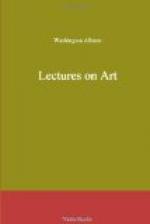that we owe all that mysterious interest which gives
the illusion of life to a work of fiction, and fills
us with delight or melts with woe, whether in the
happiness or the suffering of some imagined being,
uniting goodness with beauty, or virtue with plainness,
or uncommon purity and intellect even with deformity;
for even that may be so overpowered in the prominent
harmony of superior intellect and moral worth, as to
be virtually neutralized, at least, to become unobtrusive
as a discordant force. Besides, it cannot be
expected that
complete harmony is ever to be
realized in our imperfect state; we should else, perhaps,
with such expectation, have no pleasures of the kind
we speak of: nor is this necessary, the imagination
being always ready to supply deficiencies, whenever
the approximation is sufficiently near to call it
forth. Nay, if the interest felt be nothing more
than mere curiosity, we still refer to this presiding
Principle; which is no less essential to a simple
combination of events, than to the higher demands
of Form or Character. But its presence must be
felt, however slightly. Of this we have the evidence
in many cases, and, perhaps, most conclusive where
the partial harmony is felt to verge on a powerful
discord; or where the effort to unite them produces
that singular alternation of what is both revolting
and pleasing: as in the startling union of evil
passions with some noble quality, or with a master
intellect. And here we have a solution of that
paradoxical feeling of interest and abhorrence, which
we experience in such a character as King Richard.
And may it not be that we are permitted this interest
for a deeper purpose than we are wont to suppose;
because Sin is best seen in the light of Virtue,—and
then most fearfully when she holds the torch to herself?
Be this as it may, with pure, unintellectual, brutal
evil it is very different. We cannot look upon
it undismayed: we take no interest in it, nor
can we. In Richard there is scarce a glimmer of
his better nature; yet we do not despise him, for his
intellect and courage command our respect. But
the fiend Iago,—who ever followed him through
the weaving of his spider-like web, without perpetual
recurrence to its venomous source,—his devilish
heart? Even the intellect he shows seems actually
animalized, and we shudder at its subtlety, as at
the cunning of a reptile. Whatever interest may
have been imputed to him should be placed to the account
of his hapless victim; to the first striving with
distrust of a generous nature; to the vague sense
of misery, then its gradual developement, then the
final overthrow of absolute faith; and, last of all,
to the throes of agony of the noble Moor, as he writhes
and gasps in his accursed toils.




